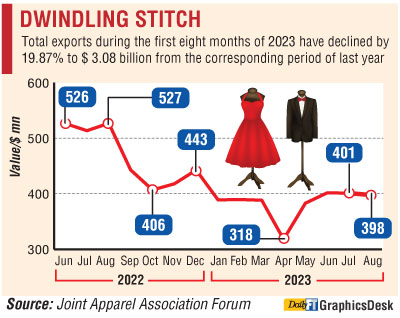Sunday Feb 22, 2026
Sunday Feb 22, 2026
Monday, 9 October 2023 00:40 - - {{hitsCtrl.values.hits}}
By Charumini de Silva
|
EDB Chairman Dr. Kingsly Bernard
|
The Export Development Board (EDB) Chairman Dr. Kingsley Bernard yesterday emphasised the need for a concerted effort among stakeholders, Government agencies and exporter organisations to propel Sri Lanka’s apparel industry to a projected $ 8 billion powerhouse by 2025.
“The apparel industry occupies an important position within the socio-economic fabric of Sri Lanka. It is incumbent upon all stakeholders, especially the State and Government organisations to support and assist this vital industry to endure the difficult times they are experiencing now in recognition of its enormous contribution to the socio-economic advancement of the country for over four decades even as facing severe challenges arising from developments both locally as well as internationally,” he told the Daily FT.
Highlighting the enduring legacy of the industry and its invaluable contribution to Sri Lanka’s socio-economic advancement, he noted that it constitutes around 40% of the country’s merchandise exports and a substantial 57% of industrial exports. Additionally, the industry contributes a robust 7% to the country’s GDP and serves as the primary employer for around 15% of the industrial sector. The sector also provides direct employment for 350,000 individuals and generates an additional 700,000 indirect jobs, solidifying its status as a linchpin in Sri Lanka’s employment landscape, he said.
“Since its establishment in the late 1970s, the apparel industry has flourished, thanks to open-market economic policies, steadfast backing from State institutions such as the EDB and the Board of Investment (BOI), and preferential market access facilitated by the Multi-Fibre Arrangement (MFA),” he added.
Dr. Bernard also stressed the global acclaim garnered by Sri Lankan manufacturers for their ethical practices and top-tier products, earning the trust of renowned fashion brands worldwide. “Beyond traditional exports, the industry has diversified, offering cutting-edge solutions through fashion BPO services, research, development, and innovation centres. Esteemed labels like Victoria’s Secret, Nike, and Ralph Lauren proudly source their products from Sri Lanka,” he said.
Dr. Bernard said the industry’s dedication to ethical practices is exemplified by its ratification of all 27 International Labour Organisation (ILO) conventions, solidifying its position as a socially responsible sourcing destination. Workers receive fair wages and operate in safe conditions, ensuring freedom from sweatshop practices and child labour. The “Garments without Guilt” code stands as a testament to the industry’s commitment to surpassing industry standards.
He recalled that despite facing challenges posed by economic cycles in the US and Europe, the industry played a pivotal role during testing times, especially in the face of the COVID-19 pandemic and last year’s economic and political upheaval. “The industry acted as a stabilising force, outperforming other major foreign exchange sources,” he pointed out.
Looking ahead, the EDB Chief asserted the industry aims to evolve into an $ 8 billion powerhouse by 2025, seeking to transition from a manufacturer-driven model to a comprehensive end-to-end solutions provider. “Industry leaders also aspire to make significant inroads into premium market segments and position Sri Lanka as the preferred ethical sourcing destination,” he said.
Dr. Bernard reiterated the importance of unified support, particularly from State organisations. “With economic downturns affecting markets in the US, UK, and EU, strategic trade negotiations become imperative. Proposals, including increasing apparel quotas and securing duty-free access to markets like India, hold promise for stabilising the sector,” he pointed out.
He said it is critical to position the apparel industry for sustainable growth. “The industry’s enduring legacy and its immense contribution to Sri Lanka’s socio-economic progress make it deserving of the support needed to surmount current challenges,” he insisted.